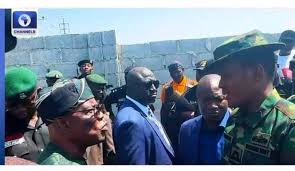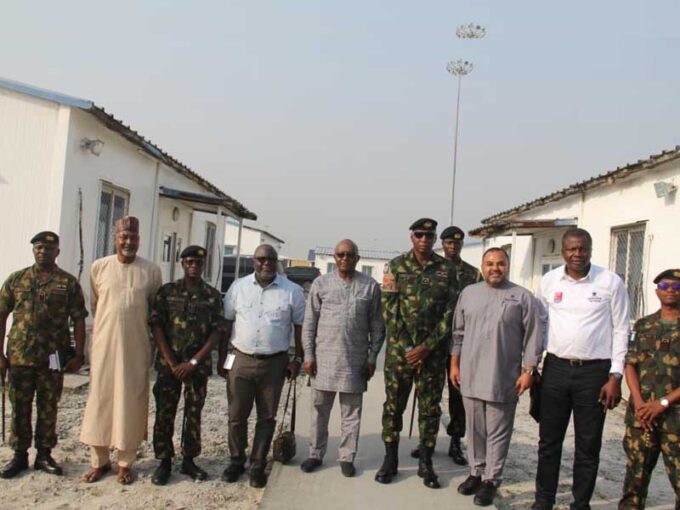Civil authority must remain paramount, not because ministers are flawless, but because democracy cannot survive without it, argues
PAT ONUKWULI
The clash between the Minister of the Federal Capital Territory (FCT), Nyesom Wike, and Naval Officer A.M. Yerima at a contested construction site in Abuja quickly escalated beyond its initial scope. What should have been a routine administrative inspection instead became a national talking point, complete with viral videos, institutional responses, and the now-familiar public chorus against political overreach. Yet beneath the commotion lies something more serious: a quiet but profound test of Nigeria’s democratic foundation.
It is not surprising that much of the public outcry aligned with the naval officer. Nigeria’s political class has, over decades, built a reputation for arrogance, and citizens often respond instinctively to any display of restraint or assertiveness from uniformed personnel. To many Nigerians, Yerima symbolised discipline confronting impunity. The public reaction was therefore emotional, immediate, and understandable.
Wike’s reputation made it easy for many to see Yerima as a hero fighting against excess. The minister’s characteristic combative rhetoric often portrays him as a man too quick to wield power and too reluctant to temper authority with tact. Yet democratic governance cannot be based on individual feelings about public officials. However, the incident’s more profound implications demand a more deliberate, dispassionate assessment.
Under Section 297(2) of the 1999 Constitution, all land in the FCT belongs to the Federal Government. Section 302 authorises the FCT Minister to administer such land. The Land Use Act, given constitutional status by Section 315(5), reinforces this authority by granting the minister powers of allocation, inspection, and revocation. Whether or not one agrees with Wike’s methods, his authority at that site stemmed not from personal bravado but from statutory and constitutional mandate.
Seen through this lens, Yerma’s refusal to grant access becomes more than a mere disagreement. It raises the spectre of insubordination by a military officer toward a senior government official acting within the law. In any functioning democracy, the principle of civilian supremacy is sacrosanct. No matter how much the public may distrust or dislike a given politician, it is the office, not the office holder, that sustains constitutional order. In other words, institutions matter more than personalities, and it is the office, not the office holder, that upholds civic order.
This is where the incident takes on a dimension reminiscent of Greek mythology. In the Iliad, Achilles defies Agamemnon not because the king is right or wrong, but because personal grievances cloud the clarity of hierarchy. The gods observe, some amused, others alarmed, as one warrior’s pride disrupts the order of the Greek camp. Nigeria, in this confrontation, found itself re-enacting a similar drama: personal dislike for a leader threatened to overshadow the fundamental logic of institutional authority.
The worrying part is how swiftly the confrontation escalated into an institutional standoff. The Nigerian military high command publicly defended the officer, insisting he acted under orders and should not be harassed. It even announced its intention to “investigate the authenticity of the land revocation,” a function clearly outside its constitutional remit. In effect, the military presented itself, not the minister, not the courts, as the arbiter of a civilian land matter. This is not only irregular; it is precarious.
Adding to the concern was the Defence Minister’s stance, which seemed to endorse the officer’s actions. Instead of reaffirming the authority of civil law, the ministry appeared defensive and introspective, supporting the uniform rather than constitutional procedures. Such signals, however subtle, can easily encourage lower-ranking officers to see the uniform as a licence to obey selectively.
The police response added a curious twist. The Inspector General of Police declared that officers would not participate in “unlawful assignments,” implying that the policemen who accompanied Wike acted improperly. Yet, this stance appears selective. The same police have provided security during countless demolitions across the country, some occurring while litigation was ongoing, others executed with insufficient notice to occupants. In Lagos, for instance, bulldozers have moved in, protected by police, despite heated disputes over their legality, especially in Lekki, Trade Fair Complex, Festac Town, Oworonshoki, Maryland, and others. In none of those cases did the police insist on determining the “lawfulness” of their involvement. Their sudden constitutional awakening in this matter, therefore, raises legitimate questions.
However, the judicial and administrative inconsistencies within the security agencies, though significant, still do not overshadow the core issue. This disagreement is not about Wike’s temperament or Yerima’s assertiveness. It concerns the structure of authority in a constitutional democracy. Can a naval officer, acting in his private capacity as a guard of a former superior, hinder a minister acting on behalf of the President? What does that imply for future civil–military relations? What message does it send to younger officers observing from afar, and what precedent does it establish for future conflicts between uniformed personnel and civilian authorities?
The episode also serves as a stark reminder of Nigeria’s still-fragile democratic ethos. It uncovers an underlying institutional fault line, one that Peter Obi aptly described as symptomatic of a nation where the boundaries between civilian and military roles are too often blurred. Even the public enthusiasm for the officer’s conduct reflects a deeper issue: Nigerians are so tired of political excess that they sometimes applaud actions which, in the long run, undermine democratic norms.
Yet one must exercise caution. Today, applause goes to a subordinate officer challenging a minister seen as overbearing. Tomorrow, the same logic could justify a soldier facing a judge, a soldier resisting a governor, or a military man obstructing civic agencies. Democracies seldom collapse suddenly; they decay gradually, through unchecked exceptions, misinterpreted gestures, and celebrated acts of defiance that weaken the foundations of civilian authority.
This incident should prompt Nigeria’s institutions, including the military, the police and the broader governance framework, to clearly define their boundaries and reinforce their constitutional responsibilities. They should resist the temptation to follow public sentiments at the expense of democratic standards. Civil authority must remain paramount, not because ministers are flawless, but because democracy cannot survive without it.
The Wike–Yerima incident will soon fade away, but its lessons will persist. When a democracy starts to celebrate disobedience simply because the target is unpopular, it risks crossing into a realm where law becomes optional. History demonstrates that no nation endures long in such a state.
Dr. Onukwuli, a legal scholar and public affairs analyst, writes from Bolton, UK. patonukwuli2003@yahoo.co.uk


















Leave a comment